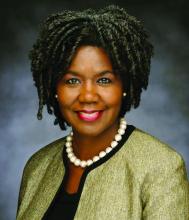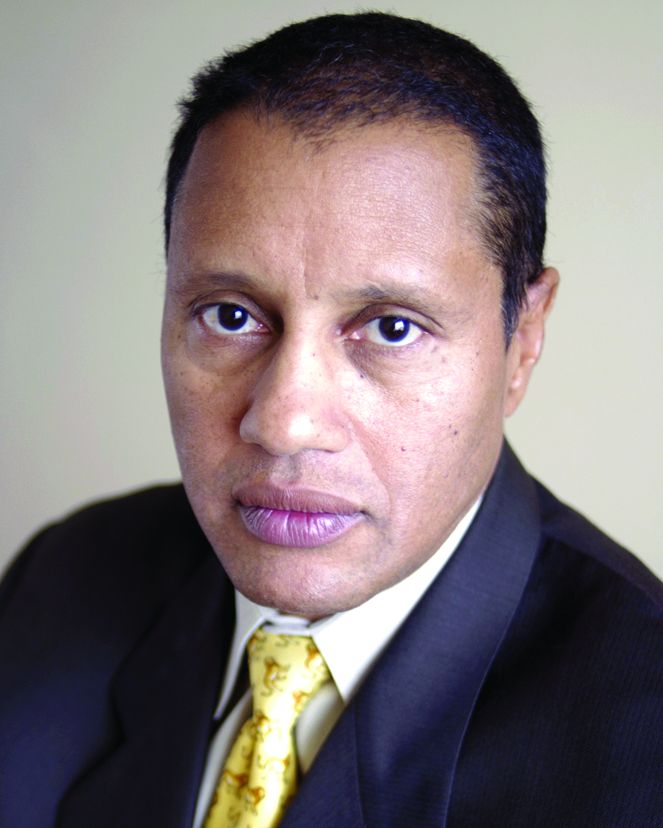User login
Dr. Carl C. Bell’s legacy ‘will live on through the multiplier effect’
As psychiatry mourns Carl Compton Bell, MD, a giant in our field, we pay homage to his legacy of leadership and productivity.
Dr. Bell wore many hats: community psychiatrist par excellence, award-winning researcher, clinician, public health advocate, mentor, and activist. Eschewing the mold of the stereotypical psychiatrist, he lectured in cowboy hats, baseball caps, message T-shirts, and shades – all conveying his youthful, down-to-earth, yet serious, psychiatrist-of-the-people style. He demonstrated that scholarship could combat racial inequities and made it clear that he had much to accomplish yet little to prove.
Dr. Bell implored physicians to not only treat health problems but also to rectify “upstream” issues. He encouraged their engagement in “bent-nail research,” empirical study directly in the communities where they work – even with limited resources. This approach, rooted in public health and prevention, undergirds his groundbreaking work in the treatment of fetal alcohol exposure with choline and folic acid. HIV prevention in South Africa was another area of study where he developed innovative strategies with successful outcomes. In his study of trauma in youth, he underscored that “risk factors are not predictive factors because of protective factors.”
He promoted social fabric, an adult protective shield, connectedness, self-esteem, self-efficacy, and social skills as protective.
A prolific author, Dr. Bell’s peer-reviewed articles are often cited and have become the gospel for community mental health. He bemoaned the insufficient translation of published research into reality in the community. His writings suggested that psychiatry should not assume that its standards of diagnosis and treatment apply entirely to nonwhite populations. This fact remains a call to action for those of us he leaves behind.
As a clinician, Dr. Bell listened intently to his patients to understand their current situations, histories, family histories, and contexts in which they lived. He was so dedicated to their care that, when a mental health center he led for years abruptly closed its doors, he set up a makeshift office on the front sidewalk to serve patients who might not have known about its closure.
Dr. Bell was active in organized psychiatry, serving as past chair of the American Psychiatric Association Council on Social Issues and Public Psychiatry. He inspired the creation of the APA’s Transformational Leadership in Public Psychiatry Fellowship for early- and mid-career psychiatrists. A loyal member of the Black Psychiatrists of America, he took pride in having saved all of BPA’s newsletters dating back to its founding in 1969.
His participation in those associations and in the National Medical Association was an avenue through which his robust scholarship encouraged the next generations of black psychiatrists. Those countless psychiatrists who trusted Dr. Bell’s wise counsel have gone on to become leaders. They are proof that his extraordinary accomplishments and spirit will live on through the multiplier effect of their contributions to the field and mentorship of future psychiatrists for years to come.
Dr. Gordon-Achebe is a child, adolescent, and adult psychiatrist practicing in the Baltimore metropolitan area. She is the immediate past president of the American Psychiatric Association’s Caucus of Black Psychiatrists and vice chair for the Council on Children, Adolescents and Their Families.
Dr. Hairston is the psychiatry residency training director at Howard University in Washington. She is the newly elected president of the American Psychiatric Association’s Caucus of Black Psychiatrists and the scientific program committee chair for the Black Psychiatrists of America.
Dr. Starks is a geriatric psychiatrist and Health and Aging Policy Fellow currently working on Capitol Hill in Washington. He is the representative to the assembly for the APA Caucus of Black Psychiatrists. He has nurtured a keen interest in understanding the cultural and social effects of geriatric mental health conditions on the lives of patients and families.
Dr. Primm, a community psychiatrist based in Baltimore, is senior medical director of the Steve Fund, which is focused on the mental health and emotional well-being of young people of color, including college students. She formerly served as deputy medical director of the APA and director of APA’s division of diversity and health equity, previously known as the Office of Minority and National Affairs.
Dr. Carl C. Bell’s legacy ‘will live on through the multiplier effect’
Dr. Carl C. Bell’s legacy ‘will live on through the multiplier effect’
As psychiatry mourns Carl Compton Bell, MD, a giant in our field, we pay homage to his legacy of leadership and productivity.
Dr. Bell wore many hats: community psychiatrist par excellence, award-winning researcher, clinician, public health advocate, mentor, and activist. Eschewing the mold of the stereotypical psychiatrist, he lectured in cowboy hats, baseball caps, message T-shirts, and shades – all conveying his youthful, down-to-earth, yet serious, psychiatrist-of-the-people style. He demonstrated that scholarship could combat racial inequities and made it clear that he had much to accomplish yet little to prove.
Dr. Bell implored physicians to not only treat health problems but also to rectify “upstream” issues. He encouraged their engagement in “bent-nail research,” empirical study directly in the communities where they work – even with limited resources. This approach, rooted in public health and prevention, undergirds his groundbreaking work in the treatment of fetal alcohol exposure with choline and folic acid. HIV prevention in South Africa was another area of study where he developed innovative strategies with successful outcomes. In his study of trauma in youth, he underscored that “risk factors are not predictive factors because of protective factors.”
He promoted social fabric, an adult protective shield, connectedness, self-esteem, self-efficacy, and social skills as protective.
A prolific author, Dr. Bell’s peer-reviewed articles are often cited and have become the gospel for community mental health. He bemoaned the insufficient translation of published research into reality in the community. His writings suggested that psychiatry should not assume that its standards of diagnosis and treatment apply entirely to nonwhite populations. This fact remains a call to action for those of us he leaves behind.
As a clinician, Dr. Bell listened intently to his patients to understand their current situations, histories, family histories, and contexts in which they lived. He was so dedicated to their care that, when a mental health center he led for years abruptly closed its doors, he set up a makeshift office on the front sidewalk to serve patients who might not have known about its closure.
Dr. Bell was active in organized psychiatry, serving as past chair of the American Psychiatric Association Council on Social Issues and Public Psychiatry. He inspired the creation of the APA’s Transformational Leadership in Public Psychiatry Fellowship for early- and mid-career psychiatrists. A loyal member of the Black Psychiatrists of America, he took pride in having saved all of BPA’s newsletters dating back to its founding in 1969.
His participation in those associations and in the National Medical Association was an avenue through which his robust scholarship encouraged the next generations of black psychiatrists. Those countless psychiatrists who trusted Dr. Bell’s wise counsel have gone on to become leaders. They are proof that his extraordinary accomplishments and spirit will live on through the multiplier effect of their contributions to the field and mentorship of future psychiatrists for years to come.
Dr. Gordon-Achebe is a child, adolescent, and adult psychiatrist practicing in the Baltimore metropolitan area. She is the immediate past president of the American Psychiatric Association’s Caucus of Black Psychiatrists and vice chair for the Council on Children, Adolescents and Their Families.
Dr. Hairston is the psychiatry residency training director at Howard University in Washington. She is the newly elected president of the American Psychiatric Association’s Caucus of Black Psychiatrists and the scientific program committee chair for the Black Psychiatrists of America.
Dr. Starks is a geriatric psychiatrist and Health and Aging Policy Fellow currently working on Capitol Hill in Washington. He is the representative to the assembly for the APA Caucus of Black Psychiatrists. He has nurtured a keen interest in understanding the cultural and social effects of geriatric mental health conditions on the lives of patients and families.
Dr. Primm, a community psychiatrist based in Baltimore, is senior medical director of the Steve Fund, which is focused on the mental health and emotional well-being of young people of color, including college students. She formerly served as deputy medical director of the APA and director of APA’s division of diversity and health equity, previously known as the Office of Minority and National Affairs.
As psychiatry mourns Carl Compton Bell, MD, a giant in our field, we pay homage to his legacy of leadership and productivity.
Dr. Bell wore many hats: community psychiatrist par excellence, award-winning researcher, clinician, public health advocate, mentor, and activist. Eschewing the mold of the stereotypical psychiatrist, he lectured in cowboy hats, baseball caps, message T-shirts, and shades – all conveying his youthful, down-to-earth, yet serious, psychiatrist-of-the-people style. He demonstrated that scholarship could combat racial inequities and made it clear that he had much to accomplish yet little to prove.
Dr. Bell implored physicians to not only treat health problems but also to rectify “upstream” issues. He encouraged their engagement in “bent-nail research,” empirical study directly in the communities where they work – even with limited resources. This approach, rooted in public health and prevention, undergirds his groundbreaking work in the treatment of fetal alcohol exposure with choline and folic acid. HIV prevention in South Africa was another area of study where he developed innovative strategies with successful outcomes. In his study of trauma in youth, he underscored that “risk factors are not predictive factors because of protective factors.”
He promoted social fabric, an adult protective shield, connectedness, self-esteem, self-efficacy, and social skills as protective.
A prolific author, Dr. Bell’s peer-reviewed articles are often cited and have become the gospel for community mental health. He bemoaned the insufficient translation of published research into reality in the community. His writings suggested that psychiatry should not assume that its standards of diagnosis and treatment apply entirely to nonwhite populations. This fact remains a call to action for those of us he leaves behind.
As a clinician, Dr. Bell listened intently to his patients to understand their current situations, histories, family histories, and contexts in which they lived. He was so dedicated to their care that, when a mental health center he led for years abruptly closed its doors, he set up a makeshift office on the front sidewalk to serve patients who might not have known about its closure.
Dr. Bell was active in organized psychiatry, serving as past chair of the American Psychiatric Association Council on Social Issues and Public Psychiatry. He inspired the creation of the APA’s Transformational Leadership in Public Psychiatry Fellowship for early- and mid-career psychiatrists. A loyal member of the Black Psychiatrists of America, he took pride in having saved all of BPA’s newsletters dating back to its founding in 1969.
His participation in those associations and in the National Medical Association was an avenue through which his robust scholarship encouraged the next generations of black psychiatrists. Those countless psychiatrists who trusted Dr. Bell’s wise counsel have gone on to become leaders. They are proof that his extraordinary accomplishments and spirit will live on through the multiplier effect of their contributions to the field and mentorship of future psychiatrists for years to come.
Dr. Gordon-Achebe is a child, adolescent, and adult psychiatrist practicing in the Baltimore metropolitan area. She is the immediate past president of the American Psychiatric Association’s Caucus of Black Psychiatrists and vice chair for the Council on Children, Adolescents and Their Families.
Dr. Hairston is the psychiatry residency training director at Howard University in Washington. She is the newly elected president of the American Psychiatric Association’s Caucus of Black Psychiatrists and the scientific program committee chair for the Black Psychiatrists of America.
Dr. Starks is a geriatric psychiatrist and Health and Aging Policy Fellow currently working on Capitol Hill in Washington. He is the representative to the assembly for the APA Caucus of Black Psychiatrists. He has nurtured a keen interest in understanding the cultural and social effects of geriatric mental health conditions on the lives of patients and families.
Dr. Primm, a community psychiatrist based in Baltimore, is senior medical director of the Steve Fund, which is focused on the mental health and emotional well-being of young people of color, including college students. She formerly served as deputy medical director of the APA and director of APA’s division of diversity and health equity, previously known as the Office of Minority and National Affairs.





